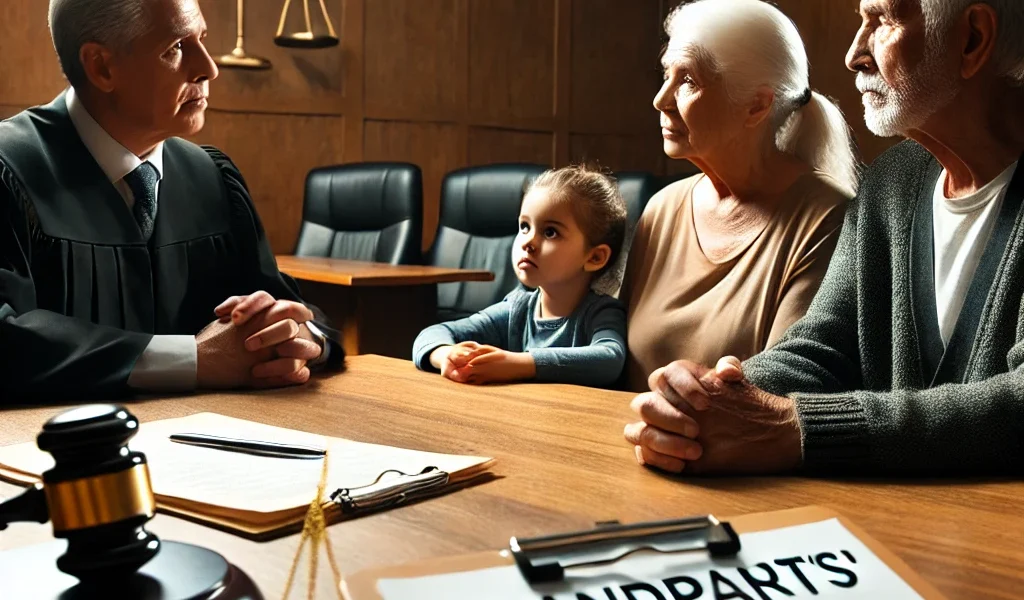Grandparents play a vital role in a child’s life, offering love, wisdom, and emotional stability. However, when family disputes arise—such as divorce, separation, or parental death—grandparents may find themselves struggling to maintain contact with their grandchildren. In such cases, understanding their legal rights regarding custody and visitation becomes essential.
This blog provides a comprehensive guide on the legal rights of grandparents in child custody and visitation, covering the legal framework, factors considered by courts, and ways to ensure grandparents’ rights are protected.
Understanding Grandparents’ Legal Rights
Grandparents’ rights to custody and visitation are not automatically granted but depend on the circumstances of the case. Legal rights vary depending on jurisdiction, as different countries and states have different laws governing this issue.
In general, grandparents can seek:
- Custody – When they believe it is in the best interest of the child to live with them.
- Visitation Rights – When they wish to maintain a relationship with their grandchild despite parental disputes.
Legal Framework Governing Grandparents’ Rights
In India, the legal framework concerning grandparents’ rights is largely governed by:
- The Hindu Minority and Guardianship Act, 1956
- The Guardians and Wards Act, 1890
- The Code of Criminal Procedure, 1973 (Section 125 for maintenance)
- Personal Laws of Different Religions
- Judicial Precedents (Court Rulings)
When Can Grandparents Seek Custody?
Courts usually prioritize parents in child custody cases. However, under certain circumstances, grandparents may be granted custody. These include:
- Parental Death – If one or both parents pass away, grandparents can apply for custody if they can provide a stable and nurturing environment.
- Parental Unfitness – If parents are deemed unfit due to addiction, abuse, neglect, or criminal behavior, grandparents may petition for custody.
- Abandonment or Neglect – If the parents have abandoned or neglected the child, courts may grant custody to grandparents.
- Best Interest of the Child – If the court determines that living with grandparents serves the child’s best interest, custody may be awarded.
- Mutual Agreement – In some cases, parents voluntarily grant custody to grandparents due to financial or personal reasons.
Factors Courts Consider in Granting Custody to Grandparents
Before granting custody to grandparents, courts examine various factors:
- Child’s Best Interest – The primary factor in any custody case.
- Emotional and Physical Well-being – The ability of grandparents to provide a stable home.
- Child’s Preference – Depending on the child’s age and maturity, their preference may be considered.
- Parental Objection – If parents object, courts evaluate the reasons.
- Existing Relationship – The strength of the bond between the grandparent and grandchild.
- Financial Stability – The ability of grandparents to support the child.
- Health and Age of Grandparents – Whether they are physically capable of raising a child.
Grandparents’ Visitation Rights
In cases where grandparents do not seek custody but want to maintain a relationship with their grandchild, they may apply for visitation rights. Courts usually consider the following before granting visitation:
- The relationship between the grandparent and grandchild.
- The reasons why the parents are denying visitation.
- The potential impact on the child’s emotional well-being.
- The child’s age and preference (if mature enough to express their wishes).
Grounds for Seeking Visitation Rights
- Parental Separation or Divorce – If parents separate or divorce, grandparents may request visitation rights.
- Parental Death – If a parent dies, the surviving parent may restrict the grandparent’s access.
- Family Disputes – Grandparents may be denied access due to strained relationships with parents.
- Adoption – If the child is adopted by a step-parent or third party, visitation rights may be restricted.
Can Parents Deny Grandparents’ Visitation?
Yes, parents can deny visitation if they believe it is not in the child’s best interest. However, grandparents can challenge this decision in court. If the court finds that visitation benefits the child, it may grant legal access to the grandparents.
How to Legally Secure Custody or Visitation
Grandparents who wish to secure custody or visitation can take the following legal steps:
- Consult a Family Law Attorney – Legal guidance is essential to understand rights and procedures.
- File a Petition in Family Court – Submit a legal request for custody or visitation.
- Provide Supporting Evidence – Gather documents proving the relationship, the child’s needs, and reasons why the request is in the child’s best interest.
- Attend Court Hearings – Present the case before the judge.
- Comply with Court Orders – Once a decision is made, follow the legal rulings regarding custody or visitation.
Frequently Asked Questions
1. Do grandparents automatically have visitation rights?
No, grandparents do not have automatic visitation rights. They must prove that visitation serves the child’s best interests.
2. Can grandparents seek custody if parents are alive?
Yes, but they must demonstrate that the parents are unfit or that living with them would be harmful to the child.
3. What happens if parents object to visitation?
Grandparents can file a petition in family court to seek visitation rights. The court will decide based on the child’s best interests.
4. Can grandparents be legal guardians?
Yes, courts can appoint grandparents as legal guardians if it is deemed beneficial for the child.
5. Can visitation rights be revoked?
Yes, if the court determines that visitation negatively affects the child, it can revoke or modify the arrangement.
Conclusion
Grandparents play a crucial role in a child’s upbringing, and legal systems recognize their importance in certain situations. While parental rights are prioritized, courts consider grandparents’ petitions for custody and visitation if they serve the child’s best interest. By understanding their legal rights and seeking appropriate legal guidance, grandparents can strengthen their chances of maintaining a meaningful relationship with their grandchildren.




